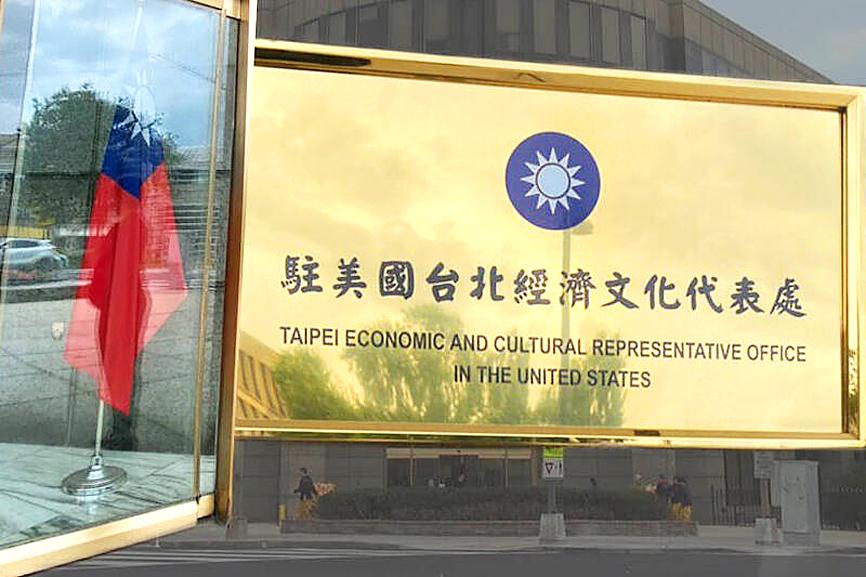A joint letter by 78 US lawmakers calls on the US government to change the name of the Taipei Economic and Cultural Representative Office (TECRO) in Washington to the “Taiwan Representative Office” and start talks toward a free-trade agreement.
Dated Thursday, the letter addressing US Secretary of State Mike Pompeo was signed by US representatives Michael McCaul, Steve Chabot and other Republicans.
Following the Nov. 3 election, US Democrats would hold 222 of the US House of Representatives’ 435 seats, compared with the Republicans’ 211.

Photo: Lu Yi-hsuan, Taipei Times
“The use of the word ‘Taipei’ fails to accurately reflect the strong ties the United States has not only with national-level government officials in Taiwan’s capital city, but with many subnational governments as well as the people of Taiwan,” the letter says.
Washington in May last year took an important first step by renaming the Coordination Council for North American Affairs in Taipei to the Taiwan Council for US Affairs, it says.
The US should extend that policy and change TECRO’s name to the “Taiwan Representative Office,” a more simple and accurate name, the letter says.
The lawmakers also asked the US Department of State to raise “self-imposed guidelines” restricting bilateral relations, including where US officials are permitted to meet with TECRO diplomats.
The restrictions “appear designed primarily to manage tensions with China,” rather than to advance US interest in US-Taiwan relations, the letter says.
The lawmakers also called for negotiation of a bilateral free- trade agreement, saying Taiwan has shown that it is ready to begin the difficult process of negotiating such a deal after the administration of President Tsai Ing-wen (蔡英文) decided to lift certain restrictions on imports of US pork and beef products.
The US should take every opportunity to expand market access in Asia, in light of the Beijing-led Regional Comprehensive Economic Partnership agreement, the letter says.
The administration of US President Donald Trump has taken bold action to adjust US policy toward China, the letter says, urging Pompeo to “make enduring changes” toward the Indo-Pacific region.
The Ministry of Foreign Affairs thanked the US lawmakers for their friendly action, saying it would continue to strive for the best national interests and to deepen the Taiwan-US partnership steadily.
Democratic Progressive Party Legislator Wang Ting-yu (王定宇) yesterday said that changing TECRO’s name does not require lawmakers to amend any law, adding that Taiwan respects the US’ internal procedures.
Democrats and Republicans have shown robust support for Taiwan, as indicated in a report by the US-China Economic and Security Review Commission that called on the Trump administration to appoint American Institute in Taiwan directors through the same process required for ambassadors, he said.

CHAOS: Iranians took to the streets playing celebratory music after reports of Khamenei’s death on Saturday, while mourners also gathered in Tehran yesterday Iranian Supreme Leader Ayatollah Ali Khamenei was killed in a major attack on Iran launched by Israel and the US, throwing the future of the Islamic republic into doubt and raising the risk of regional instability. Iranian state television and the state-run IRNA news agency announced the 86-year-old’s death early yesterday. US President Donald Trump said it gave Iranians their “greatest chance” to “take back” their country. The announcements came after a joint US and Israeli aerial bombardment that targeted Iranian military and governmental sites. Trump said the “heavy and pinpoint bombing” would continue through the week or as long

TRUST: The KMT said it respected the US’ timing and considerations, and hoped it would continue to honor its commitments to helping Taiwan bolster its defenses and deterrence US President Donald Trump is delaying a multibillion-dollar arms sale to Taiwan to ensure his visit to Beijing is successful, a New York Times report said. The weapons sales package has stalled in the US Department of State, the report said, citing US officials it did not identify. The White House has told agencies not to push forward ahead of Trump’s meeting with Chinese President Xi Jinping (習近平), it said. The two last month held a phone call to discuss trade and geopolitical flashpoints ahead of the summit. Xi raised the Taiwan issue and urged the US to handle arms sales to

BIG SPENDERS: Foreign investors bought the most Taiwan equities since 2005, signaling confidence that an AI boom would continue to benefit chipmakers Taiwan Semiconductor Manufacturing Co’s (TSMC, 台積電) market capitalization swelled to US$2 trillion for the first time following a 4.25 percent rally in its American depositary receipts (ADR) overnight, putting the world’s biggest contract chipmaker sixth on the list of the world’s biggest companies by market capitalization, just behind Amazon.com Inc. The site CompaniesMarketcap.com ranked TSMC ahead of Saudi Aramco and Meta Platforms Inc. The Taiwanese company’s ADRs on Tuesday surged to US$385.75 on the New York Stock Exchange, as strong demand for artificial intelligence (AI) applications led to chip supply constraints and boost revenue growth to record-breaking levels. Each TSMC ADR represents

Pro-democracy media tycoon Jimmy Lai’s (黎智英) fraud conviction and prison sentence were yesterday overturned by a Hong Kong court, in a surprise legal decision that comes soon after Lai was jailed for 20 years on a separate national security charge. Judges Jeremy Poon (潘兆初), Anthea Pang (彭寶琴) and Derek Pang (彭偉昌) said in the judgement that they allowed the appeal from Lai, and another defendant in the case, to proceed, as a lower court judge had “erred.” “The Court of Appeal gave them leave to appeal against their conviction, allowed their appeals, quashed the convictions and set aside the sentences,” the judges